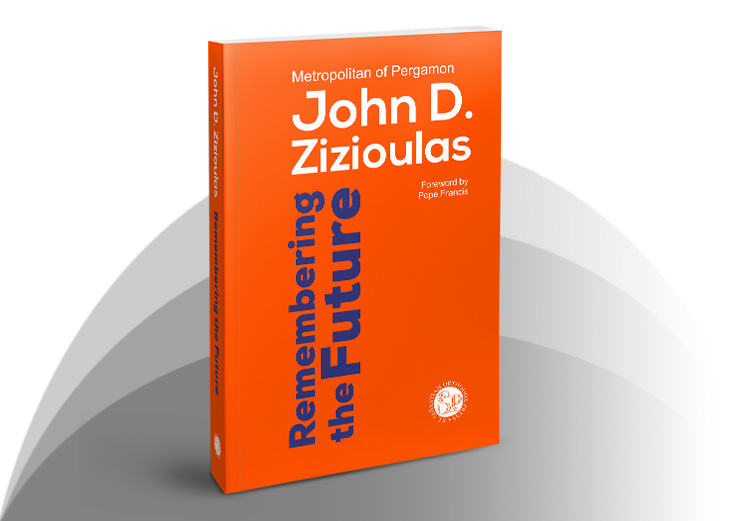Book review: Remembering the Future: Toward an Eschatological Ontology by John D. Zizioulas
Robin Gill reviews John D. Zizioulas's posthumous book "Remembering the Future: Toward an eschatological ontology" in Church Times, highlighting its exploration of eschatological and eucharistic themes intertwined with Orthodox theology.
Zizioulas, who influenced many with his conservative yet profound insights into communion and liturgy, emphasizes Christian eschatology's physical and literal aspects, linking it closely with the resurrection and purification of creation.
The review appreciates Zizioulas's integration of modern scientific perspectives with traditional theological viewpoints, presenting his work as a significant contribution to contemporary religious thought that will attract new followers to Eastern Orthodoxy.
For a deeper look into the review, visit the Church Times website.
The full text is provided below.
***
Book review: Remembering the Future: Toward an eschatological ontology by John D. Zizioulas
Robin Gill
18 October 2024
This is the long-awaited magnum opus of the Greek Orthodox theologian and bishop John Zizioulas, published posthumously a year after he died in his 92nd year. He was still a lecturer at New College, Edinburgh, when I was first appointed there as a junior lecturer.
A quiet and exotic presence, he was appointed by the formidable Barthian theologian and ecumenist Professor Tom Torrance (along with the, then Anglican, Canon Roland Walls). Chairs at New College were still heavily controlled by the Church of Scotland; so he soon moved to a chair at Glasgow. He served there for 14 years, publishing his highly influential Being as Communion in 1985, before returning to his native Greece in the 21st century as Metropolitan of Pergamon.
His long stint in Scotland persuaded him to read widely in Reformed theology, especially its more conservative exponents, such as Wolfhart Pannenberg (1928-2014). He shared Pannenberg’s very literal and physical understanding of Jesus’s resurrection (unlike some of the Patristics whom he revered), but he regarded Pannenberg’s theology as finally too individualistic and drew remarkably few ethical precepts from it — unlike, say, the early Oliver O’Donovan (whom he also admired).
The young Eastern Orthodox theologian Alexis Torrance (a great-nephew of Tom) holds him to task for this scant interest in ethics, comparing him unfavourably with Archbishop Bartholomew of Constantinople’s forthright championship of human rights. Pope Francis, however, contributes a warm foreword to this book, praising Zizioulas’s ecumenism and eucharistic, eschatological theology.
Zizioulas’s emphasis on the eschaton is just as literal and physical, albeit seeing it as healing rather than as vindictiveness: “a purification of the entire creation from evil ... [which] leads us to the association of the last judgement with the eschatological event that affects ontologically the whole creation, the resurrection as the liberation from the ‘last enemy’ of creation”. In this new book, there is even an occasional edgy nod in the direction of Pierre Teilhard de Chardin. And all of this, for Zizioulas, is prefigured in the eucharist.
Here, too, his instincts were conservative, resisting liturgical innovations: “The eucharistic gathering, as an image of the last times, certainly should involve only the baptized. In this sense, we are talking about a closed community which comes together with ‘the doors shut’...
“The eucharistic gathering should never be a means and instrument of mission, because in the last times, which it represents, there will be no mission; anyway, mission presupposes dispersal, not a gathering ‘in one place.’ Consequently, it is contrary to the nature of the Eucharist as image of the Kingdom to broadcast it over television or radio... Participation at a distance has no meaning” (page 280, his italics).
Quaintly, “participation at a distance” might be thought to characterise the very priestly and private moment of consecration in a traditional Orthodox eucharist.
Conservative as he may have been, he, like Tom Torrance, saw no conflict between theology and (a selective view of) modern science. He argued, for example, that “the final future of the universe, according to science, by the combination of Big Bang cosmology and the Second Law of Thermodynamics, will be one of extinction ... in agreement with the Athanasian idea we stress here, namely, that creation in its nature is mortal.” Steady State scientists of the previous generation would surely have caused him problems here.
To avoid mechanistic deism, he insisted: “God creates like an artist rather than a scientist... The Christian idea of creation can only be expressed by the image of an artist who aims at bringing about an entirely new world and not as eliciting meaning and beauty from what is already in existence.”
This powerful combination of communion, eucharist, Orthodox liturgy, and eschatology is likely to find a new audience among those attracted to Eastern Orthodoxy. Zizioulas once inspired many Presbyterian and Episcopalian students in Edinburgh and Glasgow. Now, with this important posthumous book, his exotic influence lives on.
Canon Robin Gill is Emeritus Professor of Applied Theology at the University of Kent and Editor of Theology.


